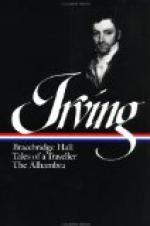September 30.
Montgomery Brewster, ESQ.,
New York.
Dear Sir:—We are in receipt of a communication from Mr. Swearengen Jones of Montana, conveying the sad intelligence that your uncle, James T. Sedgwick, died on the 24th inst. at M— Hospital in Portland, after a brief illness. Mr. Jones by this time has qualified in Montana as the executor of your uncle’s will and has retained us as his eastern representatives. He incloses a copy of the will, in which you are named as sole heir, with conditions attending. Will you call at our office this afternoon, if it is convenient? It is important that you know the contents of the instrument at once.
Respectfully yours,
Grant & Ripley.
For a moment there was only amazement in the air. Then a faint, bewildered smile appeared in Monty’s face, and reflected itself in the girl’s.
“Who is your Uncle James?” she asked.
“I’ve never heard of him.”
“You must go to Grant & Ripley’s at once, of course.”
“Have you forgotten, Peggy,” he replied, with a hint of vexation in his voice, “that we are to read ‘Oliver Optic’ this afternoon?”
CHAPTER IV
A SECOND
“You are both fortunate and unfortunate, Mr. Brewster,” said Mr. Grant, after the young man had dropped into a chair in the office of Grant & Ripley the next day. Montgomery wore a slightly bored expression, and it was evident that he took little interest in the will of James T. Sedgwick. From far back in the recesses of memory he now recalled this long-lost brother of his mother. As a very small child he had seen his Uncle James upon the few occasions which brought him to the home of Mr. and Mrs. Robert Brewster. But the young man had dined at the Drews the night before and Barbara had had more charm for him than usual. It was of her that he was thinking when he walked into the office of Swearengen Jones’s lawyers.
“The truth is, Mr. Grant, I’d completely forgotten the existence of an uncle,” he responded.
“It is not surprising,” said Mr. Grant, genially. “Every one who knew him in New York nineteen or twenty years ago believed him to be dead. He left the city when you were a very small lad, going to Australia, I think. He was off to seek his fortune, and he needed it pretty badly when he started out. This letter from Mr. Jones comes like a message from the dead. Were it not that we have known Mr. Jones for a long time, handling affairs of considerable importance for him, I should feel inclined to doubt the whole story. It seems that your uncle turned up in Montana about fifteen years ago and there formed a stanch friendship with old Swearengen Jones, one of the richest men in the far West. Sedgwick’s will was signed on the day of his death, September 24th, and it was quite natural that Mr. Jones should be named as his executor. That is how we became interested in the matter, Mr. Brewster.”




